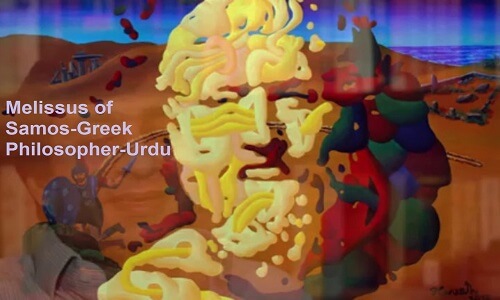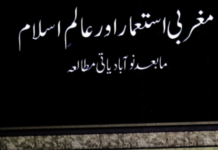Melissus of Samos-Greek Philosopher-Urdu

ملیسوس ساموسی۔ قدیم یونانی فلسفی۔ وجود کے واحد اور غیرمنقسم ہونے کا دعویٰ کیا
Melissus of Samos (fl. 5th c. BC), after Parmenides and Zeno, is the third important thinker of the Eleatic movement. Except for a philosopher, he was a naval commander, famous for his victories especially against the Athenians in 441 BC. He wrote one philosophical book in prose from which only ten fragments survive.
Theory of Being
He was a follower of Parmenides’ thought but not in all its details. On the one hand, Melissus agrees with Parmenides’ main arguments on the indestructibility, immobility, indivisibility, oneness, completeness, changelessness and perfection of Being. On the other, he adopts a different viewpoint on the Parmenidean timelessness and finitude of Being. He understood non-being in terms of spatial emptiness. Since non-being is impossible as an enclosing limit, then Being is limitless. Thus, while Parmenides’ Being is timeless infinitude, Melissus’ Being is everlasting in infinitum.
Senses and Body
He, Melissus, refutes the reliability of sense-perception. Since our senses record constant change and change is impossible then the sensible observations and data are untrustworthy or even illusionary. More extremely Melissus denies the existence of the body. Space is full, homogenous and without parts. Since there is no space to differentiate a distinct unity then the body cannot have a distinct character. So the body cannot have a distinct existence within an unlimited extension.
Parmenides’ doctrine
His works, fragments of which are preserved by Simplicius and attested by the evidence of Aristotle, are devoted to the defense of Parmenides’ doctrine. They were written in Ionic and consist of a long series of argument. Being, he says, is eternal. It cannot have had a beginning because it cannot have begun from not-being (cf. ex nihilo nihil), nor from being. It cannot suffer destruction; it is impossible for being to become not being, and if it became another being, there would be no destruction.
Fragments
- But as it always is, so it is also without limit in extent.
- Nothing that has both beginning and end is eternal or without limit.
- For if it were without limit, it would be one; for if there were two, they could not be without limit, one would limit the other.
- If it were not one thing, it would limit some other thing.
Comparison of Melissus with Zeno
The fundamental difficulty underlying this logic is the paradox more clearly expressed by Zeno of Elea and to a large extent represented in almost all modern discussion, namely that the evidence of the senses contradicts the intellect. An abstract argument has shown that change in the unity is impossible; yet the senses tell us that hot becomes cold, hard becomes soft, the living dies, and so on. From a comparison of Melissus with Zeno, it appears that the spirit of dialectic was already tentatively at work, though it was not conscious of its own power.
Forged Weapons
Neither Melissus nor Zeno seems to have observed that the application of these destructive methods struck at the root not only of multiplicity but also of the One whose existence they maintained. The weapons which they forged in the interests of Parmenides are useable with equal effect against themselves.
Note: This article was originally published on our related blog. We have merged content from our educational subdomains to provide easier access in one place. The original post is still available at: http://www.books.urdutubes.com/2019/04/melissus-of-samos-greek-philosopher-urdu.html
All content is owned and authored by us, and redistribution or reuse is not allowed without permission.
Note: This post is part of our content merger from multiple educational subdomains. To access the original content, visit: books.urdutubes.com for book-related content, PDFs, and downloads, or videos.urdutubes.com for video-related posts. All content is owned and authored by us, and redistribution or reuse is not allowed without permission.




![Khawateen Digest February 2025 [Download PDF] Khawateen Digest – February 2025 Edition: A Must-Read for Every Woman! The February 2025 issue of Khawateen Digest is packed with engaging stories, insightful articles, and practical tips that cater to the modern woman. From inspiring tales to expert beauty and health advice, this edition has it all. Whether you're in the mood for a gripping story or seeking helpful tips for daily life, this digest will keep you hooked. Don't miss out on the latest edition – download the Khawateen Digest February 2025 now and enjoy a well-rounded read that speaks to every woman's interests.](https://www.urdutubes.com/wp-content/uploads/2025/04/Khawateen-Digest-February-2025-Download-PDF-218x150.jpg)
![Khawateen Digest January 2025 [Download PDF] Khawateen Digest January 2025 [Download PDF]](https://www.urdutubes.com/wp-content/uploads/2025/04/Khawateen-Digest-January-2025-Download-PDF-218x150.jpeg)
![Kiran Digest April 2024 [Download PDF] Kiran Digest April 2024 [Download PDF]](https://www.urdutubes.com/wp-content/uploads/2025/04/Screenshot-2025-04-13-113317-218x150.png)
![Kiran Digest March 2024 [Download PDF]](https://www.urdutubes.com/wp-content/uploads/2018/05/KiranDigestMay2018255BDownloadFreePDF255D.jpg)







